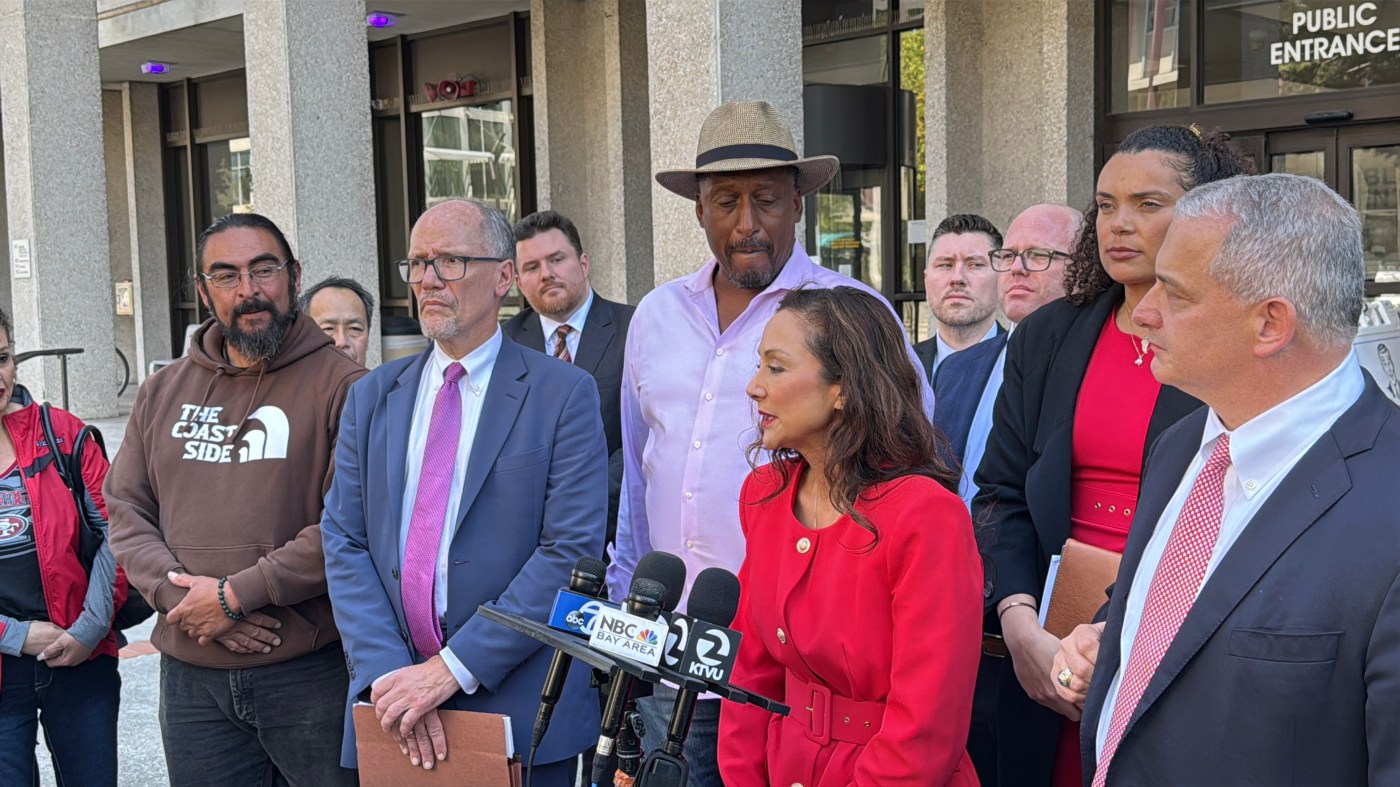San Mateo County Sheriff Christina Corpus testified for the final time Friday as her two-week removal hearing concluded, defending her leadership and denying misconduct allegations that could cost her the position she has held since 2023.
Corpus, who became emotional while describing the pressures of leading an 800-person agency, said she remains committed to her work despite calls for her resignation.
“What brings me to work every day is the commitment to the office, incarcerated people, community members, and people who don’t have a voice,” she said in response to a question from her attorney, Thomas Mazzucco.
The sheriff faces two efforts to remove her: a civil grand jury accusation filed in June alleging misconduct and abuse of power; and Measure A, a voter-approved initiative passed in March that gave the Board of Supervisors authority to remove a sheriff through 2028.
Related Articles
Sheriff Corpus’ allies defend her in high-stakes San Mateo County removal hearing
San Mateo County executive testifies in sheriff removal hearing
Former chief of staff testifies in San Mateo sheriff removal hearing
Union leader arrested by Corpus testifies in San Mateo County’s case to oust sheriff
Week one of Sheriff Corpus removal hearing ends with timecards, politics and emotion
The hearings have examined her leadership style, personnel decisions and department culture, with much of the scrutiny stemming from a 400-page investigative report released last year by retired Judge LaDoris Cordell.
Corpus has repeatedly denied claims that she retaliated against critics, misused her authority or fostered a toxic workplace, arguing instead that entrenched resistance to reform and political interference — particularly from County Executive Mike Callagy — have undermined her leadership.
She reiterated that she fired Assistant Sheriff Ryan Monaghan not for cooperating with Cordell’s investigation but because she had lost confidence in him, citing his lack of candor about his relationship with Callagy, whom he considered a friend and mentor.
She described Monaghan as insubordinate and stressed that in a “paramilitary organization” like a law enforcement agency, orders must be followed unless they are unlawful.
Her attorneys accused Callagy of working to undermine her, citing the release of the Cordell report without her knowledge, keeping Monaghan on payroll for months without requiring him to work, and later creating a position for him in the district attorney’s office while shifting Measure K funds away from the sheriff’s office. Callagy has denied those allegations.
Corpus also testified that she now supports an independent civilian inspector general to help monitor the office, due to testimonies of colleagues she described as “liars.”
She said former investigator Matthew Fox resigned because he “couldn’t take the gang mentality,” and acknowledged she does not have the support of her top brass.
Questions about promotions and transfers were raised as well, including her decision to promote and transfer Lt. Jonathan Sebring to corrections, a former professional standards bureau staffer, despite his lack of a bachelor’s degree.
She defended the promotion, saying the degree requirement was not a strict rule and that her predecessor had made similar exceptions. She added that Lt. Dan Reynolds, who was transferred from the Professional Standards Bureau to the civil division of the jails, had requested the move himself, countering claims that it was punitive.
The hearings repeatedly revisited the 2024 arrest of Deputy Sheriff’s Association President Carlos Tapia on allegations of timecard fraud. Corpus said she acted on Fox’s recommendation, which indicated there was “enough probable cause for the arrest.” Conflicting testimony from Corpus, Fox, and the district attorney’s office emerged over what was actually communicated, but Corpus denied that she ever rushed the case.
She also rejected allegations of an inappropriate relationship with former Chief of Staff Victor Aenlle, challenging the credibility of Valerie Barnes, a key witness who claimed firsthand knowledge of the affair.
Earlier this week, Millbrae City Manager Tom Williams testified that Barnes once said, “I’m going to get that b****,” after being passed over for a promotion.
In closing arguments, Corpus’ attorney Tom Perez, a former White House official, focused heavily on Barnes’ credibility, calling her the “lynchpin” of the relationship allegations and accusing her of having a vendetta against Corpus.
“Voters voted on the Cordell report that was on the website. Somebody lied — it was Tom Williams or Valerie Barnes,” Perez said, urging the hearing officer to consider Barnes’ alleged motive.
County attorney Jan Little countered that Corpus’ reform agenda could not excuse misconduct.
“In any profession, good works don’t excuse unlawful conduct, correct?” Little asked during cross-examination.
“It does not,” Corpus replied.
The sheriff closed her testimony with an emotional account of the toll the job has taken on her and her family, describing the pain of hearing people criticize her in front of her children and emphasizing the importance of her health care for her son’s medical needs.
Corpus portrayed herself as a 30-year public servant trying to bring “much-needed change” to an agency resistant to reform.
County spokesperson Effie Verducci said Measure A was designed to provide a formal process for the Board of Supervisors to investigate complaints about an elected sheriff, not as a pretext to remove her.
“Investigations found that she misuses her authority, created a high-level position for a close associate without qualifications and fosters a workplace culture marked by retaliation,” Verducci said.
She added that testimony and evidence from the hearings will be reviewed by the hearing officer, retired Judge James Emerson, who has 45 days to submit a recommendation to the Board of Supervisors. The board would then have 30 days to act, with removal requiring a four-fifths vote at a public meeting.
After the hearing, Perez told reporters the proceedings were “reverse engineered” and “predetermined,” saying, “We will cross that road when we get there” when asked if he believed Emerson would side with Corpus.
If Corpus is removed, the board would have 30 days to appoint a replacement or call a special election. If it fails to act, the county elections office must schedule one.





